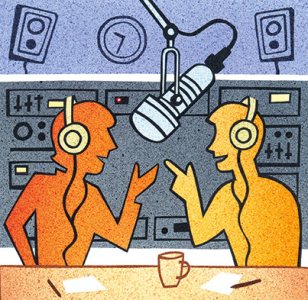
Lounge Act
A new WRBC-FM program brings the faculty to the world
By Elizabeth McKean ’12 and Gabrielle Otto ’11
Once a week, seniors Matthew Reynolds and Tucker Pawlick welcome a faculty member into the underground WRBC radio station on Frye Street for their show The Faculty Lounge.
Interviewers and interviewees perch on stools next to microphones, cloistered by the blinking lights of the radio gear, hundreds of CDs, and illustrations of sea creatures on the ceiling.
In Reynolds’ words, the show falls “somewhere between a lecture and Crossfire.” He and Pawlick, of Westport, Conn., try for a relaxed atmosphere where their intense interest in the guests can engender a genuine conversation.
“The idea for the show started as an archive project,” explained Reynolds of Mill Valley, Calif. — a Web repository of faculty lectures and interviews. “Then we started thinking about it as a radio show, like Fresh Air, where prospective and current students could listen to admired professors in dialogue about their current academic projects.”
He adds, “Our show extends discussion beyond the classroom,” allowing professors to share their current work and passions. “And it promotes a more equal and accessible relationship between professors and students.”
A March episode featured Eric Hooglund, visiting professor of politics. Hooglund is a leading American scholar on Muslim countries, particularly Iran, and has written for The New York Times and the U.K.’s Guardian about last summer’s elections in Iran. The WRBC hosts focused on his experiences in Iran during the 1979 Islamic Revolution and his insights into the country’s present political climate.
Hooglund’s interest in Iran began during a Peace Corps stint in the late 1960s. He returned in 1978 and 1979 to complete research for his dissertation. He told the WRBC listeners that this was “a fascinating time with a lot of energy and excitement.”
Pawlick and Reynolds asked if there was a time when he felt particularly immersed in the revolution. Hooglund recalled learning that a close friend, a short-story writer and activist, had been killed by the Shah’s secret police. This event inspired Hooglund to translate his friend’s banned stories into English and have them published.
More broadly, the experience brought home to Hooglund the importance of struggling against injustice, he explained, as Pawlick referred to the professor’s long involvement in social justice work.
Hooglund was pleasantly surprised by his interviewers’ skill, he said after the broadcast. “They actually got me to think about issues I don’t normally think about, and we had a stimulating conversation about my diverse intellectual interests and political activism.”
As hosts, said Reynolds, “we’ve become more confident with our interviewees. It’s becoming more of a dialogue than a monologue, though we still think our listeners are more interested in what our guests have to say than what we do.”
Pawlick agreed. “At Bates there are all these really smart people who are a great resource. And if they have something interesting to say, I’m going to want to listen.”



